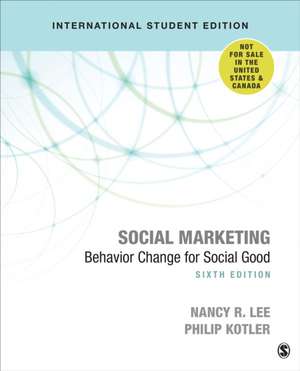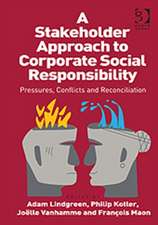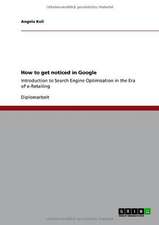Social Marketing - International Student Edition: Behavior Change for Social Good
Autor Nancy R. Lee, Philip Kotleren Limba Engleză Paperback – 27 feb 2019
Preț: 818.88 lei
Preț vechi: 1106.60 lei
-26% Nou
156.69€ • 164.04$ • 129.65£
Carte disponibilă
Livrare economică 17-31 martie
Livrare express 28 februarie-06 martie pentru 48.10 lei
Specificații
ISBN-10: 1544371861
Pagini: 634
Dimensiuni: 187 x 232 x 27 mm
Greutate: 0 kg
Ediția:Sixth Edition
Editura: SAGE Publications
Colecția Sage Publications, Inc
Locul publicării:Thousand Oaks, United States
Cuprins
Marketing Highlight: Reducing Deaths from Drug Overdoses
What is Social Marketing?
Where Did the Concept Originate?
How Does it Differ from Commercial Marketing?
How Does it Differ from Other Disciplines?
What Is Its Value Proposition?
Who Does Social Marketing?
What Social Issues Can Benefit?
Other Ways to Impact Social Issues
Social Marketing Upstream and Midstream
Chapter Summary
2. 10 Step Strategic Planning Model
Marketing Highlight: WaterSense—An EPA Partnership Program
Marketing Planning: Process and Influences
A 10 Step Plan
Why is Systematic Planning Important?
What Are Similar Planning Models?
Where Does Research Fit In?
Chapter Summary
Marketing Dialogue: The 4Ps: Aren’t There More?
3. Research Options
Marketing Highlight: Increasing Utilization of Sexual and Reproductive Services among Young Girls in Uganda
Major Research Terminology
Steps in Developing a Research Plan
Research “That Won’t Break the Bank”
Chapter Summary
4. Behavior Change Theories, Models, Frameworks
Marketing Highlight: Increasing Behavior Change Rates Using Triggers
Informing Audience Segmentation and Selection
Informing Behavior Selection and Goals
Deepening Understanding of Audience Barriers, Benefits, Motivators, Competition, Influential Others
Inspiring Development of Marketing Intervention Mix Strategies
Themes from All
Chapter Summary
Research Highlight: Reducing Obesity in Indonesia
5. Steps 1 & 2 Social Issue, Purpose, Focus, Situation Analysis
Marketing Highlight: Reducing Global Communicable Disease: Zika in Puerto Rico
Step 1: Describe Social Issue, Background, Purpose, Focus
Step 2: Conduct Situation Analysis, Review Prior Efforts
Exploratory Research in Steps 1 and 2
Ethical Considerations When Choosing Focus
Chapter Summary
Research Highlight: Increasing Healthy Food Choices in Military Dining Halls Observation Research
6. Step 3: Selecting Priority Audiences
Marketing Highlight: Influencing Local TV Weathercasters
Step 3: Select Priority Audiences
Steps in Selecting Priority Audiences
Variables Used to Segment Markets
Criteria for Evaluating Segments
How Priority Audiences are Selected
What Approaches Should Be Chosen?
Ethical Considerations Selecting Priority Audiences
Chapter Summary
Research Highlight: Decreasing Underage Drinking: Mystery Shoppers to Evaluate Interventions
7. Behavior Objectives and Target Goals
Marketing Highlight: Decreasing “Boating Under the Influence (BUIs)”
Step 4: Set Behavior Objectives and Goals
Behavior Objectives
Knowledge and Belief Objectives
Target Goals
Objectives and Goals are Drafts
Objectives and Goals Used for Campaign Evaluation
Ethical Considerations Setting Objectives and Goals
Chapter Summary
8. Step 5: Audience Insights
Marketing Highlight: Reducing Food Waste in Australia
Step 5: Identify Audience Insights
What You Need to Know about Priority Audience
How to Learn More about Priority Audience
How Insights Help Develop Strategy
Potential Revisions
Ethical Considerations When Researching Priority Audience
Chapter Summary
Research Highlight: Reducing Cardiac Death Risks among Firefighters
9. Crafting a Desired Positioning
Marketing Highlight: Increasing Engagement of Fathers
Positioning Defined
Step 6: Develop Positioning Statement
Behavior-Focused Positioning
Barriers-Focused Positioning
Benefits-Focused Positioning
Competition-Focused Positioning
Repositioning
How Positioning Relates to Branding
Ethical Considerations Developing Positioning Statement
Chapter Summary
Research Highlight: Addressing the Opioid Crisis
10. Product: Creating a Product Platform
Marketing Highlight: Increasing Pet Adoption
Product: The First “P”
Step 7: Develop Product Platform
Design Thinking
Branding
Ethical Considerations for Product Platform
Chapter Summary
Research Highlight: Reducing Anemia in Cambodia
11. Price: Determining Incentives and Disincentives
Marketing Highlight: Decreasing Dog Attacks in Australia
Price: The Second “P”
Step 7: Determine Incentives and Disincentives
More on Commitments and Pledges
Setting Prices: Tangible Goods and Services
Ethical Considerations for Pricing Strategies
Chapter Summary
Research Highlight: Increasing the Habit of Handwashing in India
12. Place: Making Access Convenient and Pleasant
Marketing Highlight: Four Innovative Uses of Place Tool
Place: The Third “P”
Step 7: Develop Place Strategy
Social Franchising
Ethical Considerations When Selecting Distribution Channels
Chapter Summary
Research Highlight: Reducing Opioid Overdose Deaths
13. Promotion: Deciding on Messages, Messengers, and Creative Strategies
Marketing Highlight: Increasing Gun Control Legislation
Promotion: The Fourth “P”
Step 7: Develop Promotion Strategy
A Word about Creative Briefs
Message Strategy
Messenger Strategy
Creative Strategy
Pretesting
Ethical Considerations: Messages, Messengers, Creative Strategies
Chapter Summary
Research Highlight: Testing HPV-Related Messages with Pediatricians
14. Promotion: Selecting Communication Channels
Marketing Highlight: Preventable Injuries in Canada
Promotion: Selecting Communication Channels
Traditional Communication Channels
The New Communication Channels
Product Integration
Factors Guiding Communication Channel Decisions
Ethical Considerations When Selecting Communication Channels
Chapter Summary
Research Highlight: Using Social Media to Decrease Adolescent Substance Abuse
15. Monitoring and Evaluation
Marketing Highlight: Truth Initiative
Step 8: Develop a Plan for Evaluation
Why Are You Conducting this Measurement?
What Will You Measure?
How Will You Measure?
When Will You Measure?
How Much Will It Cost?
Ethical Considerations in Evaluation Planning
Chapter Summary
Research Highlight: InMotion: Every Trip Counts
16. Budget and Funding Plans
Marketing Highlight: Increasing Funding through Corporate Social Marketing
Step 9: Budgets and Funding Sources
Determining Budgets
Justifying the Budget
Finding Sources for Additional Funding
Appealing to Funders
Revising Your Plan
Ethical Considerations when Establishing Funding
Chapter Summary
Research Highlight: Informing Budget and Funding with Literature Review
17. Implementation and Sustaining Behaviors Plans
Marketing Highlight: How Can Social Marketing Reduce Homelessness?
Step 10: Complete an Implementation Plan
Phasing
Sustainability
Anticipating Forces against Change
Sharing and Selling Your Plan
Ethical Considerations Implementing Plans
Chapter Summary
Research Highlight: Increasing High School Graduation Rates from 55% to 86%
Notă biografică
Nancy R. Lee, is president of Social Marketing Services, Inc., in Seattle, Washington, a strategic advisor for social marketing campaigns at C+C in Seattle, an affiliate instructor at the University of Washington, where she teaches social marketing. With more than 35 years of practical marketing experience in the public and private sectors, Ms. Lee has held numerous corporate marketing positions, including vice president and director of marketing for Washington State¿s second-largest bank and director of marketing for the region¿s Children¿s Hospital and Medical Center.
Ms. Lee has participated in the development of more than 250 social marketing campaign strategies for public sector agencies, and consulted with more than 100 nonprofit organizations . Clients in the public sector include the Centers for Disease Control and Prevention (CDC), Environmental Protection Agency (EPA), Washington State Department of Health, Office of Crime Victims Advocacy, County Health and Transportation Departments, Department of Ecology, Department of Fisheries and Wildlife, Washington Traffic Safety Commission, City of Seattle, and Office of Superintendent of Public Instruction. Campaigns developed for these clients targeted issues listed below:
· Health: COVID-19, opioid overdose, teen pregnancy prevention, HIV/AIDS prevention, nutrition education, sexual assault, diabetes prevention, adult physical activity, tobacco control, arthritis diagnosis and treatment, immunizations, dental hygiene, senior wellness, and eating disorder awareness
· Safety: texting and driving, drowning prevention, senior fall prevention, underage drinking and driving, youth suicide prevention, binge drinking, pedestrian safety, and safe gun storage
· Environment: natural gardening, preservation of fish and wildlife habitats, grass fires, recycling, trip reduction, water quality, and water and power conservation
She has conducted social marketing workshops around the world (Uganda, Jordan, South Africa, Ghana, Ireland, Scotland, Australia, Singapore, Canada, Indonesia, India, Bangladesh, Venezuela, Japan, Haiti) for more than 4,000 public sector employees involved in developing behavior change campaigns in the areas of health, safety, the environment, and financial well-being. She has been a keynote speaker on social marketing at conferences for public health, improved water quality, energy conservation, family planning, nutrition, recycling, teen pregnancy prevention, influencing financial behaviors, wildfire prevention, litter control, and foodwaste reduction.
Ms. Lee has coauthored eleven other books with Philip Kotler: Social Marketing: Improving the Quality of Life (2002); Corporate Social Responsibility: Doing the Most Good for Your Company and Your Cause (2005); Marketing in the Public Sector: A Roadmap for Improved Performance (2006); Social Marketing: Influencing Behaviors for Good (2008 and 2011); Social Marketing: Changing Behaviors for Good (2016); GOOD WORKS! Marketing and Corporate Initiatives That Build a Better World... And the Bottom Line (2012); Up and Out of Poverty: The Social Marketing Solution (2009); Social Marketing in Public Health (2010); Social Marketing to Protect the Environment (2011); Success in Social Marketing: 100 Case Studies From Around the Globe (2022). She also authored a book Policymaking for Citizen Behavior Change: A Social Marketing Approach (2017) andhas contributed articles to the Stanford Social Innovation Review, Social Marketing Quarterly, Journal of Social Marketing, and The Public Manager. (See more on Nancy Lee at www.socialmarketingservice.com.)



















